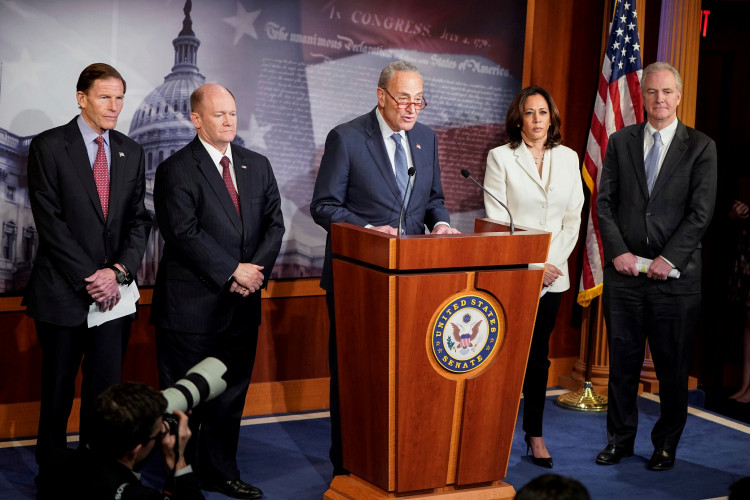The U.S. Senate Thursday reasserted the constitutional power that only Congress can make war by curbing President Donald Trump's power to attack or use military force against Iran without congressional approval.
Out of the 100 senators comprising the Senate, 55 voted to uphold the War Powers Resolution spearheaded by Sen. Tim Kaine (D-VA) restricting Trump's ability to attack Iran or any other country without the consent of the Senate and the House of Representatives. And, in a surprising display of bipartisanship, eight Republican senators joined all 45 Democratic and two Independent senators in supporting Kaine's resolution. There are 53 Republican senators.
The resolution will also require Trump to remove U.S. troops engaged in hostilities against Iran unless Congress declares war or passes a specific authorization for the use of military force.
The resolution's approval is essentially a rebuke of Trump's decision to order the murder of Iranian major general Qasem Soleimani in Iraq last January 3. The aerial drone assassination of the commander of Iran's Quds Force brought the U.S. and Iran to the brink of war.
Kaine said the vote shows bipartisan strength and reflects the importance of Congress' key involvement in any decision to deploy the U.S. troops in harm's way.
"If we're to order our young men and women in uniform to risk their lives and health in war, it should be on the basis of careful deliberation," said Kaine.
He also said the resolution "just says no war with Iran, unless you come and make that case to Congress. And if you make the case to Congress, in front of the American people and we all have the discussion, ask the tough questions and conclude sadly, it's in the national interest, that's one thing,"
Trump has promised to veto the Senate resolution and there isn't expected to be enough support in the Senate to obtain the two-thirds majority to override Trump's veto.
Sen. Mike Lee (R-UT), one of the Republicans that voted for the resolution, said it's time Congress asserted its constitutional power to wage war.
"We need Congressional authorization (to wage war)," said Lee. "We've been lied to by the Pentagon for years regarding a war that has gone on two decades. That's long enough... we don't want any more wars without the people's elected representatives being able to debate."
The Senate's move to crimp Trump's power to use U.S. military force overseas followed a similar move by the House on January 10. The House approved a similar measure relating to the War Powers Resolution of 1983 that restricts Trump's authority to strike Iran without congressional approval. The Democrat-controlled House passed the resolution by a vote of 224 to 194. This later triggered the Senate vote.
The resolution was sponsored by freshman Democrat congresswoman and former intelligence analyst Elissa Slotkin from Michigan nearly a week after Trump authorized Soleimani's killing. Democrats and some Republicans were outraged Trump failed to consult Congress in advance of the murder, and saw it as an overreach of executive power.
The House's concurrent resolution "directs the President to terminate the use of United States Armed Forces to engage in hostilities in or against Iran or any part of its government or military" unless Congress has declared war or specifically authorized engaging in hostilities, or if "such use of the Armed Forces is necessary and appropriate to defend against an imminent armed attack upon the United States."






